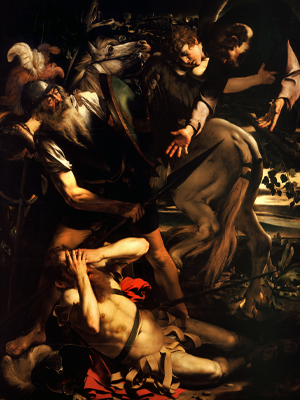Scripture:
Acts 22:3-16 or Acts 9:1-22
Mark 16:15-18
Reflection:
To Rise Above the Toxins of Disparagement, Division, and Hatred…
to Remain “Unharmed by Deadly Poison”

Today, the Church celebrates the Feast of the Conversion of St. Paul. Catholics honor the saints as intercessors, models of holiness, and witnesses to the faith, rooted in our core belief in “the communion of saints”. This practice enriches the spiritual life of the Church and encourages us, the faithful, to pursue holiness in our own lives.
Like Sacred Scripture, though, this practice is not merely past HISTORY, it is OUR STORY. And lest St. Paul’s conversion become a pseudo-pious anecdote of some rabbi/Pharisee traveling to Damascus in the first century, we believe it is also a celebration of our own call to ongoing conversion or ‘metanoia’ (i.e., change of mind or heart, a turning around).
Earlier this week, The Week of Prayer for Christian Unity, Episcopalian Bishop Mariann Elder Budde preached on the ‘Pillars of Unity’ at Washington National Cathedral, centering her text on Jesus’ parable about building our houses on rock, not sand. With many dignitaries and high-ranking officials in the congregation, including President Trump and Vice President Vance, she spoke of the pillars of truth and humility, then concluded her reflection with a final pillar of unity — mercy — making a plea for compassion, especially for the LGBTQ+ community and immigrants:
“They are afraid… the people who pick our crops and clean our office buildings, who labor in poultry farms and meatpacking plants, who wash the dishes after we eat in restaurants, and work the night shifts in hospitals,” she said. “They may not be citizens or have the proper documentation. But the vast majority of immigrants are not criminals. They pay taxes and are good neighbors. They are faithful members of our churches and mosques, synagogues and temples.”
The next day, in an interview, she was asked what is the role of the church in moral leadership today… in helping people understand what is our moral responsibility? Knowing that various denominations around the country offer themselves as sanctuaries for people who are facing the threat of deportation, this is most pertinent in understanding our conversion.
Bishop Budde responded that the first and primary role we have is by example. We are to take the teachings of our faith and welcome the stranger, to love as we have been loved, to be compassionate and to live this out in real terms with real people. And then, when given the opportunity, to speak. We are called to be the conscience, and at other times to be the consolation, the presence, of Christ.
May we share our experience of our loving, merciful God. Blessings to you for this Feast of Conversion!
Fr. Jack Conley, CP, is the local superior of St. Vincent Strambi Community in Chicago, Illinois.
